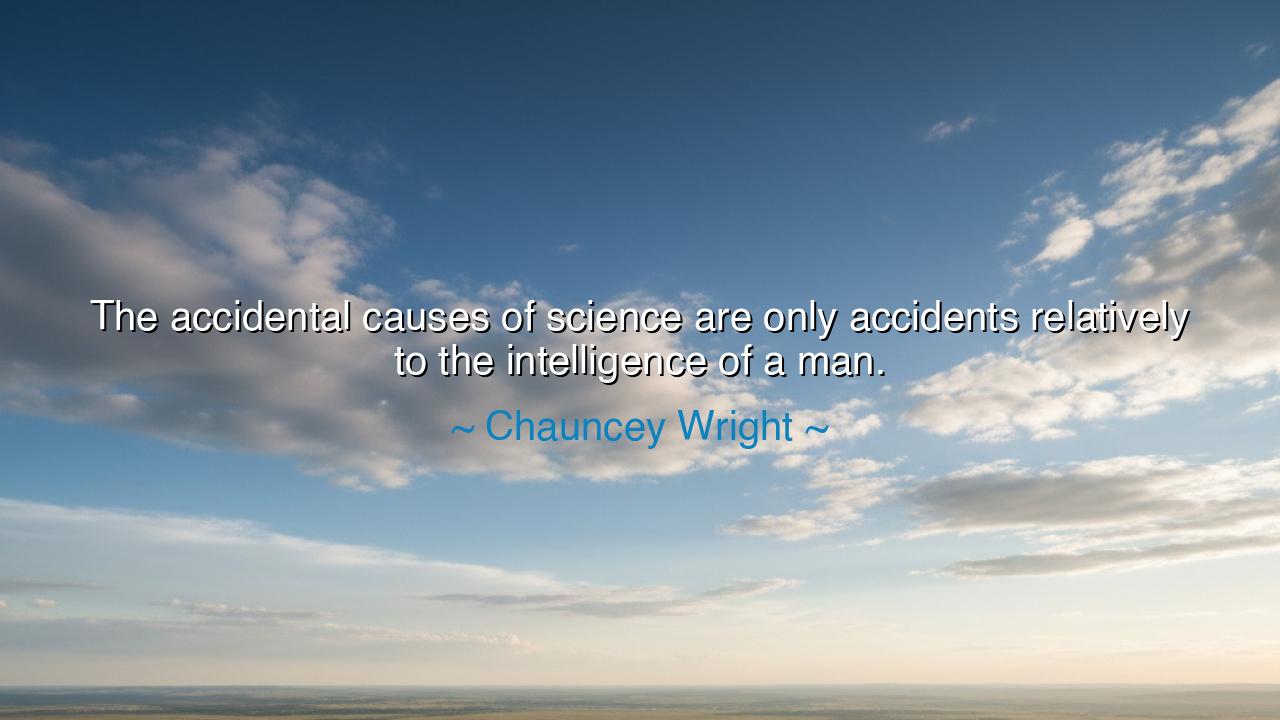
The accidental causes of science are only accidents relatively to
The accidental causes of science are only accidents relatively to the intelligence of a man.






The words of Chauncey Wright, “The accidental causes of science are only accidents relatively to the intelligence of a man,” shine with a quiet but immense brilliance, like the light of a distant star whose meaning unfolds only to those who linger to watch. Beneath their calm phrasing lies a revelation about knowledge, intelligence, and destiny—that what we call chance in the unfolding of discovery is only chance to those who do not yet understand. For to the mind that perceives deeply, to the soul that studies and questions with patience, the accidents of the world reveal themselves as patterns, and the patterns as laws. Wright, a philosopher of reason and a contemporary of Darwin, knew that intelligence transforms chaos into order, and what seems random to one age becomes revelation to the next.
To understand the origin of this quote, we must first know the man who spoke it. Chauncey Wright was a 19th-century American philosopher, a defender of empiricism and a bridge between science and the philosophy of the mind. He was a thinker who lived during the dawning age of evolution, when humanity was beginning to see itself not as the master of nature, but as its student. His words come from an age when the world trembled between faith and reason, between the ancient belief in divine design and the new belief in natural law. Yet Wright’s insight reached beyond either extreme: he saw that intelligence itself—the ability to perceive meaning in what seems meaningless—is the divine spark in humankind. The “accidents of science” are only accidents to those who have not yet learned to see the hidden unity of the world.
In this, Wright echoes a wisdom older than himself. The ancients, too, wrestled with the nature of chance. The Greeks called it Tyche, the unpredictable goddess who ruled fortune. But as philosophy grew, the wise began to see that what appears as chance is but ignorance of cause. Aristotle said that chance is only what happens beyond our foresight; to the gods, who see all, nothing is random. Wright, inheriting this ancient thought, brought it into the language of modern science. To him, the accidents that gave birth to discovery—the apple that fell before Newton, the mold that grew for Fleming, the spark that leapt from wire to wire for Franklin—were not truly accidental. They were the unfolding of deeper principles that only an awakened intelligence could grasp.
Consider the story of Alexander Fleming, who discovered penicillin in 1928. To many, it seemed pure chance—an accident of a contaminated petri dish. But in truth, it was intelligence that recognized meaning in that accident. Countless others before him had seen mold grow on cultures and discarded them; Fleming alone looked again. His mind, trained by curiosity and illuminated by observation, saw that this small imperfection was in fact a miracle. Here lies the essence of Wright’s wisdom: accidents are only accidental to the unprepared mind. To the intelligent, every accident becomes an opportunity for understanding.
Wright’s insight teaches us that science is not the conquest of chaos by control, but the transformation of mystery by perception. The universe does not reveal its secrets to the indifferent or the proud, but to those who are humble enough to listen. The wind that bends the grass, the motion of the stars, the random flicker of atoms—all appear accidental to the eye that sees only surfaces. But the intelligent mind, patient and awake, perceives the harmony behind these seeming dissonances. It realizes that accident is the language through which the universe speaks to those willing to interpret it.
Yet Wright’s message is not only for the philosopher or the scientist—it is for all who live. How often in life do we, too, call things accidents that are in truth lessons in disguise? The meeting of a stranger, the loss that redirects our path, the failure that awakens new strength—these, too, are accidents only to the surface mind. The wise heart, like the wise scientist, looks deeper and sees that even in chaos there is order, and in uncertainty, guidance. The intelligence of a man, when allied with humility and wonder, transforms misfortune into revelation.
So, what lesson shall we take from Chauncey Wright’s words? That we must cultivate not only knowledge but vision—the ability to discern meaning where others see none. We must train the mind not merely to gather facts, but to perceive connections, to sense purpose even in the unpredictable. When faced with what seems random, let us not despair or dismiss it as chance. Let us ask, “What truth hides here?” For in that question lies the beginning of wisdom.
Thus, remember this teaching, O seeker of understanding: the universe is not a chaos of accidents, but a cosmos awaiting comprehension. What we call coincidence is the meeting point between mystery and awareness. Sharpen your mind, open your spirit, and you will find that nothing in life is wasted, nothing meaningless, nothing truly accidental. For the intelligent heart, guided by curiosity and reverence, transforms every accident into revelation—and in doing so, becomes a co-creator with the universe itself.






AAdministratorAdministrator
Welcome, honored guests. Please leave a comment, we will respond soon